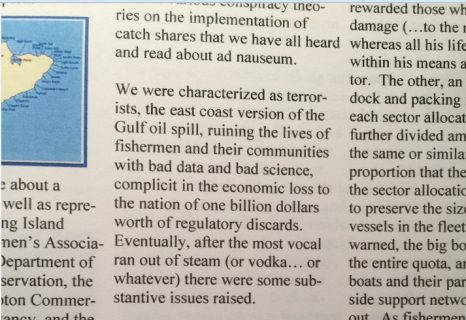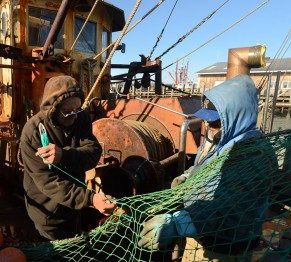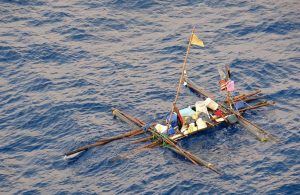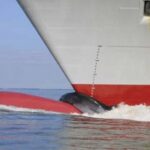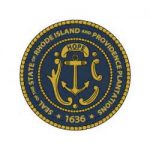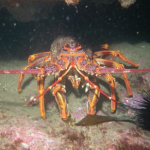Tag Archives: at-sea monitors
Gloucester: During protest in harbor, fishermen say fish rules need more leeway
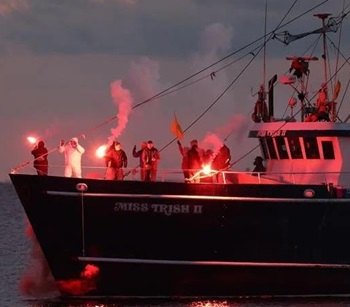 More than 50 people, including fishermen, their families and supporters, stood along Stacy Boulevard in the cold at dusk Wednesday to watch the 96-foot dragger F/V Miss Trish II steam into the Outer Harbor with its crew waving flares in a protest. A couple of smaller fishing vessels followed. The short and peaceful protest was called by Russo, after two trips this fall during which the Massachusetts Environmental Police allege a small percentage of the vessel’s catch was below minimum size, despite, he says, taking steps to follow the rules, including using at-sea monitors and installing cameras on the vessel for a second trip. Russo’s father and owner of the Miss Trish II, Capt. Enzo Russo, and some of the Miss Trish II crew stood along the boulevard in support. “And now the law says we’ve got 100% observers the whole time,” Enzo Russo said. 7 Photos, more, >>click to read<< 10:05
More than 50 people, including fishermen, their families and supporters, stood along Stacy Boulevard in the cold at dusk Wednesday to watch the 96-foot dragger F/V Miss Trish II steam into the Outer Harbor with its crew waving flares in a protest. A couple of smaller fishing vessels followed. The short and peaceful protest was called by Russo, after two trips this fall during which the Massachusetts Environmental Police allege a small percentage of the vessel’s catch was below minimum size, despite, he says, taking steps to follow the rules, including using at-sea monitors and installing cameras on the vessel for a second trip. Russo’s father and owner of the Miss Trish II, Capt. Enzo Russo, and some of the Miss Trish II crew stood along the boulevard in support. “And now the law says we’ve got 100% observers the whole time,” Enzo Russo said. 7 Photos, more, >>click to read<< 10:05

Herring Fishermen lose challenge to rule requiring at-sea monitors
A federal judge in Washington D.C. on Tuesday denied the bid of New Jersey-based herring fishermen who sued the National Marine Fisheries Service (NMFS) last year to block a new regulation that will require them to pay for third-party “at-sea monitors” who will survey by-catch. U.S. District Judge Emmet Sullivan ruled that the agency had not acted in violation of the MSA,,, About half-a-dozen small fishing vessel operators, including the Loper Bright Enterprise, brought the lawsuit last year. >click to read< 11:57

A message from Chris Oliver on National-Level Observer Waiver Criteria; Redeployment in Northeast To Begin
To improve transparency in our approach to observer deployment, we have established national-level criteria for vessels to be waived (released) from observer or at-sea monitor coverage. Going forward, observer or monitor coverage may be waived, for both full and partial-coverage fisheries, on a trip-specific basis if one of the following two criteria are met: (1) Observers or at-sea monitors are not available for deployment; or (2) The observer providers cannot meet the safety protocols imposed by a state on commercial fishing crew or by the vessel or vessel company on its crew. Within our limited authority, our efforts are intended to ensure observers and monitors are following the same safety protocols that fishermen are following. >click to read< 17:50
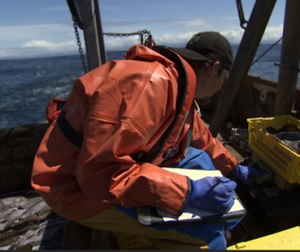
Fisheries across nation seeking monitor waivers
What began in the fisheries of New England has spread across the country. Fishing stakeholders from as far away as the West Coast and Alaska have joined Northeast commercial fishermen in pressuring NOAA Fisheries to extend — and uniformly apply — waivers from having to carry at-sea monitors and other observers on vessels while the COVID-19 pandemic still rages. The Seafood Harvesters of America, an umbrella organization that represents 18 separate fishing groups from Maine to Alaska, wrote to NOAA Fisheries and Department of Commerce officials this week to advance many of the same safety arguments against reinstating observers aboard commercial fishing vessels in the midst of the pandemic. >click to read< 16:30
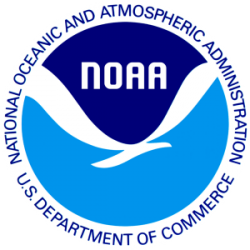
Re-Deploying Observers and At-Sea Monitors: Northeast Observer Waiver Extended Through July 31, 2020
Although we had announced plans to resume observer deployments on July 1, we recognize the Coronavirus pandemic continues to evolve and as such, has required us to re-evaluate and adapt to changing circumstances. In response, NOAA Fisheries is extending the waiver granted to vessels with Greater Atlantic Region fishing permits to carry human observers or at-sea monitors through July 31, 2020. This action is authorized by 50 CFR 648.11, which provides the Greater Atlantic Regional Administrator authority to waive observer requirements, and is also consistent with the criteria described in the agency’s emergency rule on observer waivers during the COVID-19 pandemic. >click to read< 16:00

Coronavirus: Fishermen cite at-sea monitors as potential virus source
Groundfishermen and sector managers are growing increasingly frustrated at NOAA Fisheries over what they perceive as the lack of clarity on at-sea monitoring requirements in the midst of the novel coronavirus outbreak. Dave Leveille, manager for Northeast Fishing Sectors II and VI, said Thursday that he has fielded numerous queries from fishermen asking why they still are being forced to accept assigned at-sea observers on their boats while health experts and the federal government are encouraging measures to reduce human contact to try to halt the spread of the dangerous virus. >click to read< 11:19
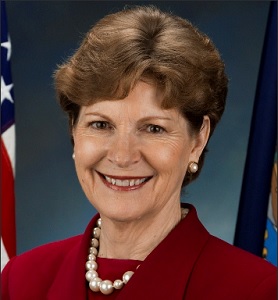
Fishing Money found for at-sea monitors
As part of a $1.4 trillion spending package, the U.S. Senate passed a $79.4 billion appropriations bill that includes another $10.3 million for NOAA Fisheries — once again secured by New Hampshire Sen. Jeanne Shaheen — to fully fund at-sea monitoring in the Northeast groundfish fishery for the 2020 fishing season that begins May 1. When President Donald Trump signed the bill into law the next day, the mandated shouldering of the full financial weight of at-sea monitoring by the groundfish industry — at a cost of up to $700 per day per vessel — had been deferred for at least another fishing season. >click to read< 12:24
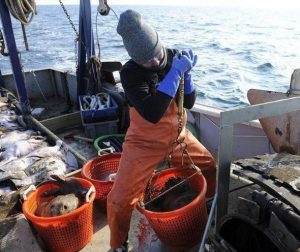
Groundfishermen not hooked by monitoring alternatives
For more than two years, the New England Fishery Management Council has worked on an intricate groundfish monitoring amendment that could have wide-scale economic and regulatory consequences for groundfishermen. It has been a thorny, winding path that involves a host of groundfish committees, plan development teams and assorted staff within the far-flung fisheries regulatory landscape. Now a group of groundfishermen are weighing in. And they are not pleased. >click to read<07:53
NOAA Fisheries rule should alarm taxpayers
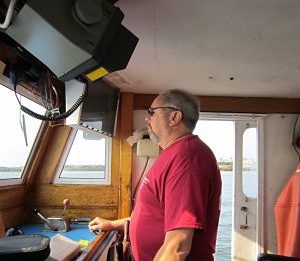 NOAA Fisheries has discovered a devious way to increase their budget without the checks and balances guaranteed by our forefathers, and the courts have let it stand. I have been involved in a lawsuit with NOAA Fisheries over who pays for at-sea monitors (ASM) for the last three years. These are basically our own personal state police men who ride along on the boat and watch and record everything fishermen do at sea. Fishermen have been forced to sign contracts with for-profit third-party companies that provide this service for $710 per day. Recently, the Supreme Court refused to hear our case, effectively ending our pursuit of justice. Readers should be concerned, not only because this job-killing regulation effects their ability to obtain local seafood, but also because the loss leaves in place a precedent that will allow regulatory agencies to tax citizens by passing regulations while bypassing Congress. click here to read the op-ed 08:56
NOAA Fisheries has discovered a devious way to increase their budget without the checks and balances guaranteed by our forefathers, and the courts have let it stand. I have been involved in a lawsuit with NOAA Fisheries over who pays for at-sea monitors (ASM) for the last three years. These are basically our own personal state police men who ride along on the boat and watch and record everything fishermen do at sea. Fishermen have been forced to sign contracts with for-profit third-party companies that provide this service for $710 per day. Recently, the Supreme Court refused to hear our case, effectively ending our pursuit of justice. Readers should be concerned, not only because this job-killing regulation effects their ability to obtain local seafood, but also because the loss leaves in place a precedent that will allow regulatory agencies to tax citizens by passing regulations while bypassing Congress. click here to read the op-ed 08:56
Groundfishermen: ‘It feels like we’re just forgotten’ – Fishermen who followed Goethel’s path through the federal courts said they were disappointed with the outcome. Goethel said he was “disillusioned” by the process. “Talk about feeling forgotten,” said Jamie Driscoll, a commercial fisherman from Kingston. “That’s how it feels. It feels like we’re just forgotten.” click here to read the op-ed
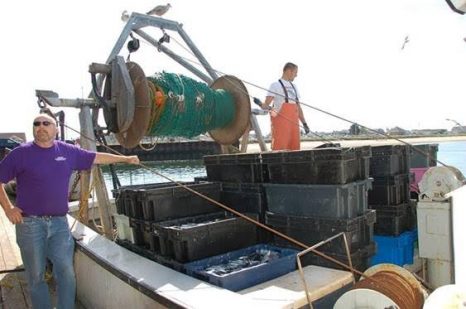
Why are fishermen guilty until proven innocent? A case against putting video cameras on every boat
As many of you may know, my husband filed a lawsuit against the National Marine Fisheries Service to stop them from requiring the fishermen to pay for the At-Sea monitors that the Fisheries Service requires ground fishermen to take on their boats. The cost is upwards of $700 a day, which is more than the small family owned fishing boats make here in New England. The Supreme Court decided not to hear their case which the lower courts had dismissed on a technicality because the suit was not filed within a 30 day time frame. Some people have suggested video monitoring as an alternative. I have addressed that in my comments below click here to read Ellen Goethels post 15:01
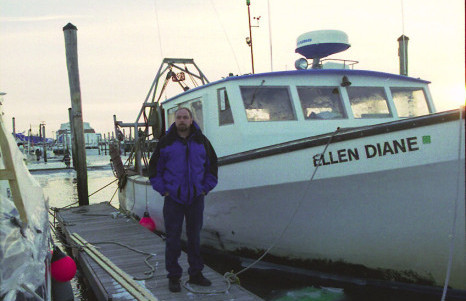
Fisherman David Goethel takes case to US Supreme Court
After losing a lawsuit alleging a federal agency has imposed unfair regulations, Hampton fisherman David Goethel is taking his case to the U.S. Supreme Court. Cause of Action Institute, which is representing Goethel and a group of other fishermen pro bono, filed a petition to be taken up by the Supreme Court Tuesday. The suit was originally filed in U.S. District Court against the National Oceanic and Atmospheric Administration and U.S. Department of Commerce in 2015. It alleges NOAA unfairly requires commercial groundfishermen to fund at-sea monitors to join them on fishing trips and observe their compliance with regulations. click here to read the story 15:52
Withdraw Unlawful Plan Forcing Fishermen to Pay for At-Sea Monitors – Cause of Action Institute
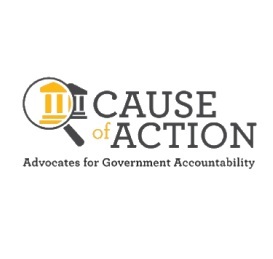 Cause of Action Institute (“CoA Institute”) has submitted a regulatory comment to the New England Fishery Management Council (“NEFMC”) questioning the Council’s legal authority to move forward a controversial amendment that would force more fishermen to pay for costly at-sea monitors, which are the government’s responsibility. CoA Institute advised the NEFMC to abandon the Omnibus Amendment, which would imperil an already hard-hit fishing industry by requiring certain fishermen to pay for monitors to police their at-sea activity. The plan would also open more regional Atlantic fisheries to industry-funded monitors. “The Omnibus Amendment is unlawful and will make it virtually impossible for countless small-business fishermen to pursue their livelihood,” said Julie Smith, CoA Institute Vice President. “Many of these fishermen come from families that have fished American coastal waters for generations. The federal government should not regulate them out of business. Congress has not authorized it and the economic consequences are too dire. If an agency lacks statutory authority or appropriated funds, it has no power to act. The New England Council should withdraw the Omnibus Amendment.” The cost for a monitor under the amendment is expected to range from $710 to $818 per day at sea. That would exceed the revenue a fisherman typically lands from his daily catch. CoA Institute represents fishermen challenging another industry-funded monitoring program in the Northeast groundfish fishery. In that case, a government study predicted that industry-funded monitoring would result in up to 60 percent of mostly small-scale vessels going out of business—a result that the government blithely characterized as a “restructuring” of the groundfish fleet. Learn more about the case HERE 14:00
Cause of Action Institute (“CoA Institute”) has submitted a regulatory comment to the New England Fishery Management Council (“NEFMC”) questioning the Council’s legal authority to move forward a controversial amendment that would force more fishermen to pay for costly at-sea monitors, which are the government’s responsibility. CoA Institute advised the NEFMC to abandon the Omnibus Amendment, which would imperil an already hard-hit fishing industry by requiring certain fishermen to pay for monitors to police their at-sea activity. The plan would also open more regional Atlantic fisheries to industry-funded monitors. “The Omnibus Amendment is unlawful and will make it virtually impossible for countless small-business fishermen to pursue their livelihood,” said Julie Smith, CoA Institute Vice President. “Many of these fishermen come from families that have fished American coastal waters for generations. The federal government should not regulate them out of business. Congress has not authorized it and the economic consequences are too dire. If an agency lacks statutory authority or appropriated funds, it has no power to act. The New England Council should withdraw the Omnibus Amendment.” The cost for a monitor under the amendment is expected to range from $710 to $818 per day at sea. That would exceed the revenue a fisherman typically lands from his daily catch. CoA Institute represents fishermen challenging another industry-funded monitoring program in the Northeast groundfish fishery. In that case, a government study predicted that industry-funded monitoring would result in up to 60 percent of mostly small-scale vessels going out of business—a result that the government blithely characterized as a “restructuring” of the groundfish fleet. Learn more about the case HERE 14:00
Lawsuit over fisheries observers to reach Court of Appeals in March
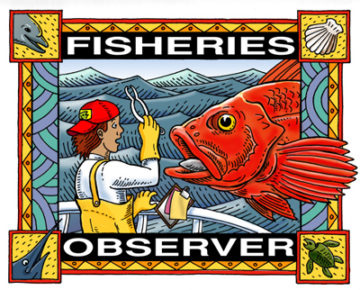 A New England fishermen’s group suing the federal government over the cost of at-sea monitoring is scheduled to present oral arguments before the federal Court of Appeals in March. The government shifted the cost of paying for monitors to fishermen last year. A group led by New Hampshire fisherman David Goethel sued the government over the rule change. The fishermen lost in federal district court and appealed. Attorneys say the arguments are set to take place March 7. Monitors can cost hundreds of dollars per day. Fishermen argue it represents an illegal new cost burden they can’t shoulder in an era of tight quotas. The rules apply to fishermen of species such as cod and sole. link 11:16
A New England fishermen’s group suing the federal government over the cost of at-sea monitoring is scheduled to present oral arguments before the federal Court of Appeals in March. The government shifted the cost of paying for monitors to fishermen last year. A group led by New Hampshire fisherman David Goethel sued the government over the rule change. The fishermen lost in federal district court and appealed. Attorneys say the arguments are set to take place March 7. Monitors can cost hundreds of dollars per day. Fishermen argue it represents an illegal new cost burden they can’t shoulder in an era of tight quotas. The rules apply to fishermen of species such as cod and sole. link 11:16
East Coast fishermen file appeal over cost of government-required ‘at-sea monitors’
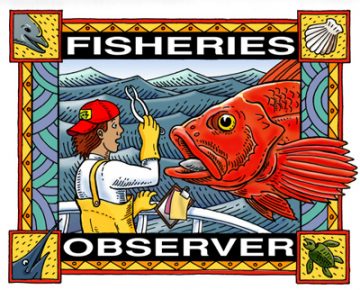 The National Oceanic and Atmospheric Administration, NOAA, requires groundfishermen — those who catch cod, haddock and other common bottom-dwelling species — to carry on board “at-sea monitors.” The observers, hired by three for-profit companies, are third-party workers whose task it is to observe fishermen’s compliance with federal regulations and ensure annual quotas are not exceeded. The dispute lies in the cost of the monitors and who should pay for them: Fishermen are billed on average $700 a day when a regulator is present. NOAA, meanwhile, says monitors were placed on fishing boats like Goethel’s only 14 percent of the time in 2016 — and claims the fishing industry supported this system of regulation in 2010 when a vote went before the New England Fishery Management Council, an advisory board to NOAA that sets the rules. “At sea monitors were originally supported by the sectors when we went from a days-at-sea form of management to a quota based form of management in 2010,” said John Bullard, the regional administrator for NOAA’s Greater Atlantic Regional Fisheries Office. Read the story here 14:22
The National Oceanic and Atmospheric Administration, NOAA, requires groundfishermen — those who catch cod, haddock and other common bottom-dwelling species — to carry on board “at-sea monitors.” The observers, hired by three for-profit companies, are third-party workers whose task it is to observe fishermen’s compliance with federal regulations and ensure annual quotas are not exceeded. The dispute lies in the cost of the monitors and who should pay for them: Fishermen are billed on average $700 a day when a regulator is present. NOAA, meanwhile, says monitors were placed on fishing boats like Goethel’s only 14 percent of the time in 2016 — and claims the fishing industry supported this system of regulation in 2010 when a vote went before the New England Fishery Management Council, an advisory board to NOAA that sets the rules. “At sea monitors were originally supported by the sectors when we went from a days-at-sea form of management to a quota based form of management in 2010,” said John Bullard, the regional administrator for NOAA’s Greater Atlantic Regional Fisheries Office. Read the story here 14:22
Fisherman appeals case shifting monitor costs
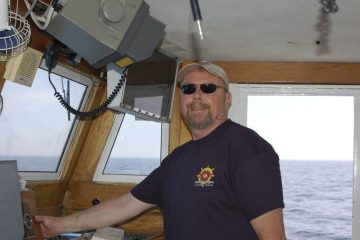 New Hampshire fisherman David Goethel is looking to the federal appeals court to overturn a federal judge’s ruling that allows NOAA Fisheries to impose the cost of at-sea monitoring on Northeast groundfish permit holders. Goethel, represented by lawyers from the Cause of Action watchdog group, has filed an appeal with the First Circuit Court of Appeals in Boston, hoping to reverse U.S. District Court Judge Joseph Laplante’s July 29 ruling in Goethel’s lawsuit that granted summary judgment to the federal government. “NOAA lacks the authority to require industry funding for at-sea monitors. Its decision to do so violates federal statutes and the Constitution,” said Alfred Lechner Jr., president and chief executive officer of Cause of Action as well as a former federal judge. “Our clients had a legal right to their day in court at the time they filed suit. The decision holding otherwise is an error. An appeal from the decision of the district court has been filed.” Read the story here 08:13
New Hampshire fisherman David Goethel is looking to the federal appeals court to overturn a federal judge’s ruling that allows NOAA Fisheries to impose the cost of at-sea monitoring on Northeast groundfish permit holders. Goethel, represented by lawyers from the Cause of Action watchdog group, has filed an appeal with the First Circuit Court of Appeals in Boston, hoping to reverse U.S. District Court Judge Joseph Laplante’s July 29 ruling in Goethel’s lawsuit that granted summary judgment to the federal government. “NOAA lacks the authority to require industry funding for at-sea monitors. Its decision to do so violates federal statutes and the Constitution,” said Alfred Lechner Jr., president and chief executive officer of Cause of Action as well as a former federal judge. “Our clients had a legal right to their day in court at the time they filed suit. The decision holding otherwise is an error. An appeal from the decision of the district court has been filed.” Read the story here 08:13
East Coast fishermen spar with federal government over cost of at-sea monitors
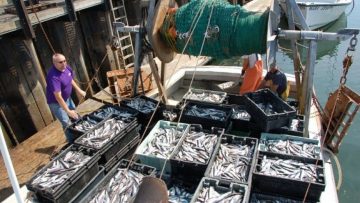 Every year, the federal government spends millions monitoring New England commercial fishermen to ensure they ply their timeless maritime trade in accordance with the law. Now, a judge is set to rule on who should foot the bill for the on-board monitors: the government or the fishing boat owners. The East Coast fishermen say sticking them with the bill would be the “death knell” for their industry and is illegal on the part of the federal government. Fishermen of important New England food species such as cod and haddock will have to start paying the cost of at-sea monitors soon under new rules. Monitors — third-party workers hired to observe fishermen’s compliance with federal regulations — collect data to help determine future fishing quotas and can cost about $18,000 a year, or $710 per voyage. “It is unlawful for NOAA to force struggling fishermen to pay for their own at-sea monitors,” said former federal judge Alfred Lechner, the institute’s president and CEO. “The significant costs of these regulations should be the responsibility of the government.” Read the rest here 08:57
Every year, the federal government spends millions monitoring New England commercial fishermen to ensure they ply their timeless maritime trade in accordance with the law. Now, a judge is set to rule on who should foot the bill for the on-board monitors: the government or the fishing boat owners. The East Coast fishermen say sticking them with the bill would be the “death knell” for their industry and is illegal on the part of the federal government. Fishermen of important New England food species such as cod and haddock will have to start paying the cost of at-sea monitors soon under new rules. Monitors — third-party workers hired to observe fishermen’s compliance with federal regulations — collect data to help determine future fishing quotas and can cost about $18,000 a year, or $710 per voyage. “It is unlawful for NOAA to force struggling fishermen to pay for their own at-sea monitors,” said former federal judge Alfred Lechner, the institute’s president and CEO. “The significant costs of these regulations should be the responsibility of the government.” Read the rest here 08:57
Monitoring The Catch Aboard Groundfishing Vessels
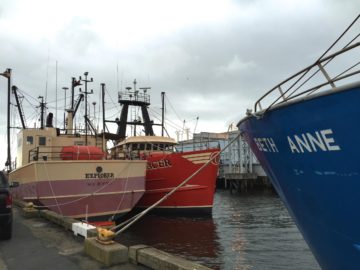 Regulations are stiff in the commercial fishing industry – and especially so for those who go after groundfish like cod and haddock. Now, one of the industry’s biggest players is accused of skirting those regulations for years – allegedly cooking the books and reaping big profits on illegally caught groundfish. As Brian Morris reports, that’s having a ripple effect on small, single-boat groundfishermen who play by the rules. Around the docks of New Bedford, people know Carlos Rafael as the “Codfather,” a legendary, self-made figure who dominates the city’s biggest industry. He manages a fleet of some 40 vessels, and also operates a fish distribution operation. Authorities raided his business in February, and federal officials allege he was changing documents – falsifying the types of fish he reported catching. Audio, Read the rest here 14:26
Regulations are stiff in the commercial fishing industry – and especially so for those who go after groundfish like cod and haddock. Now, one of the industry’s biggest players is accused of skirting those regulations for years – allegedly cooking the books and reaping big profits on illegally caught groundfish. As Brian Morris reports, that’s having a ripple effect on small, single-boat groundfishermen who play by the rules. Around the docks of New Bedford, people know Carlos Rafael as the “Codfather,” a legendary, self-made figure who dominates the city’s biggest industry. He manages a fleet of some 40 vessels, and also operates a fish distribution operation. Authorities raided his business in February, and federal officials allege he was changing documents – falsifying the types of fish he reported catching. Audio, Read the rest here 14:26
Framework 55 slashes groundfish quotas, halves at-sea monitors, enviros pissed
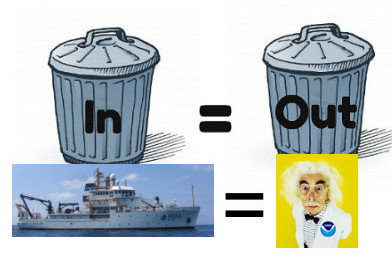 It seems the proposed rule, also known as Framework 55, has a little bit of something for everyone to hate. They have until close of business on April 5 to submit their comments to the National Oceanic and Atmospheric Administration. Environmental groups, such as Oceana, are bitterly criticizing the projected reduction in ASM for groundfish boats to about 14 percent from about 24 percent, saying the rule will “weaken the chances of recovery for this historic fishery.” Fishermen point to the further reductions in what they already consider minuscule catch quotas and say those reductions — combined with the absorption of the costs for ASM — could finally be the management initiative that shutters the Northeast multispecies groundfish fishery for good. Read the rest here 20:10
It seems the proposed rule, also known as Framework 55, has a little bit of something for everyone to hate. They have until close of business on April 5 to submit their comments to the National Oceanic and Atmospheric Administration. Environmental groups, such as Oceana, are bitterly criticizing the projected reduction in ASM for groundfish boats to about 14 percent from about 24 percent, saying the rule will “weaken the chances of recovery for this historic fishery.” Fishermen point to the further reductions in what they already consider minuscule catch quotas and say those reductions — combined with the absorption of the costs for ASM — could finally be the management initiative that shutters the Northeast multispecies groundfish fishery for good. Read the rest here 20:10
Ret Talbot – Fishery Data versus Anecdote through the Lens of Sector Management
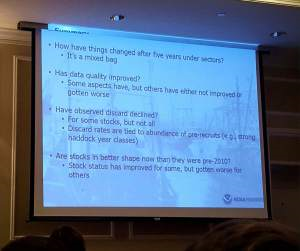 At this year’s Maine Fishermen’s Forum, many old themes are the topic of current conversations. Fisheries managers and scientists point to data that show a fishery resource squarely on the ropes, while many in the fishing industry maintain that there are more fishes in the water than any time in recent memory. Industry often views the current management system as one that forces fishers into a situation where they are “constantly trying not to catch fish” due to quotas imposed by managers based on science the industry views as suspect. The discrepancy between industry and managers–between anecdote and data–is troubling and continues to foment mistrust, frustration and outright anger. Read the rest here 13:19
At this year’s Maine Fishermen’s Forum, many old themes are the topic of current conversations. Fisheries managers and scientists point to data that show a fishery resource squarely on the ropes, while many in the fishing industry maintain that there are more fishes in the water than any time in recent memory. Industry often views the current management system as one that forces fishers into a situation where they are “constantly trying not to catch fish” due to quotas imposed by managers based on science the industry views as suspect. The discrepancy between industry and managers–between anecdote and data–is troubling and continues to foment mistrust, frustration and outright anger. Read the rest here 13:19
Fishing industry fighting cost of at-sea monitors
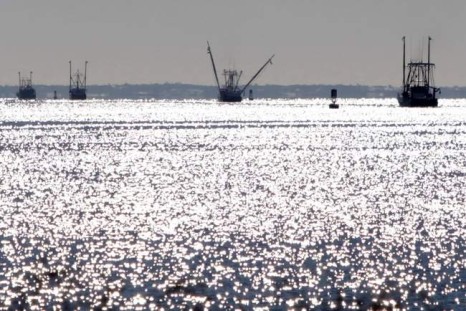 Fishermen are opposing new catch-monitoring costs that could take effect March 1, as a judge’s ruling this week gave the industry a setback in efforts to block the transition from government funding. John Haran of Dartmouth, manager of a local fishery sector, said in December that transferring the regulatory costs to the fishing industry could put more than 40 local groundfishing boats out of business. Local fishing industry tycoon Carlos Rafael said the costs — potentially about $700 per monitored trip — could mean repeated expenses of $14,000 across 20 groundfishing boats in his fleet. Read the article here 07:50
Fishermen are opposing new catch-monitoring costs that could take effect March 1, as a judge’s ruling this week gave the industry a setback in efforts to block the transition from government funding. John Haran of Dartmouth, manager of a local fishery sector, said in December that transferring the regulatory costs to the fishing industry could put more than 40 local groundfishing boats out of business. Local fishing industry tycoon Carlos Rafael said the costs — potentially about $700 per monitored trip — could mean repeated expenses of $14,000 across 20 groundfishing boats in his fleet. Read the article here 07:50
Fishermen in court to protest at-sea monitoring cost shift
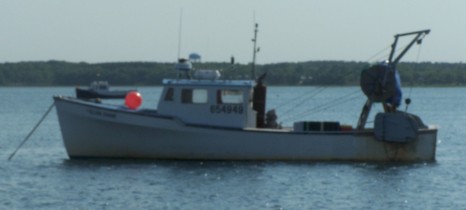 A group of East Coast fishermen who are challenging the federal government about the cost of at-sea monitoring is due for a hearing in court. New England fishermen will have to start paying the cost of at-sea monitors soon under new rules. Fishermen challenging the rules are due in U.S. District Court in Concord on Thursday for a hearing on their motion for an injunction. At-sea monitors collect data to help determine future fishing quotas. The monitors can cost about $800 per trip. A group of fishermen contends that the cost shift is illegal. One of the fishermen involved in the lawsuit is Hampton, New Hampshire-based David Goethel. He says many fishermen won’t be able to afford the added cost. Link 07:59
A group of East Coast fishermen who are challenging the federal government about the cost of at-sea monitoring is due for a hearing in court. New England fishermen will have to start paying the cost of at-sea monitors soon under new rules. Fishermen challenging the rules are due in U.S. District Court in Concord on Thursday for a hearing on their motion for an injunction. At-sea monitors collect data to help determine future fishing quotas. The monitors can cost about $800 per trip. A group of fishermen contends that the cost shift is illegal. One of the fishermen involved in the lawsuit is Hampton, New Hampshire-based David Goethel. He says many fishermen won’t be able to afford the added cost. Link 07:59
Video: The Phil Paleologos Show – A Talk About At Sea Monitors and Other Regulations For Fishermen
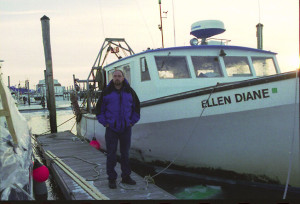 Phil Paleologos hosts a conversation regarding a lawsuit over a provision that would require fishermen to pay for at-sea monitors. This conversation included David Geothel, a fisherman and plaintiff in the lawsuit; Richard Canastra, of the Buyers and Sellers Exchange or BASE; Don Cuddy, Program Director for the Center for Sustainable Fisheries; and , the Manager of Sector 13. A court hearing will take place January 21. Watch the video here 11:20
Phil Paleologos hosts a conversation regarding a lawsuit over a provision that would require fishermen to pay for at-sea monitors. This conversation included David Geothel, a fisherman and plaintiff in the lawsuit; Richard Canastra, of the Buyers and Sellers Exchange or BASE; Don Cuddy, Program Director for the Center for Sustainable Fisheries; and , the Manager of Sector 13. A court hearing will take place January 21. Watch the video here 11:20
Questions schooling around at-sea fishing monitors – NOAA says money to run out in February
 The battle over the cost and scope of at-sea monitoring of Northeast groundfish vessels, now being played out on various regulatory and legal platforms, promises a hectic end to the current fishing season and a complex start to the next. There are no shortage of questions. When will the federal government run out of money and shift the responsibility for paying for observers to the permit holders? And what of the Goethel lawsuit filed with the support of Cause for Action, the nonprofit government watchdog agency? Read the article here. 08:10
The battle over the cost and scope of at-sea monitoring of Northeast groundfish vessels, now being played out on various regulatory and legal platforms, promises a hectic end to the current fishing season and a complex start to the next. There are no shortage of questions. When will the federal government run out of money and shift the responsibility for paying for observers to the permit holders? And what of the Goethel lawsuit filed with the support of Cause for Action, the nonprofit government watchdog agency? Read the article here. 08:10
NOAA’s unlawful regulation – Lack of fairness, parity at play in at-sea monitors
 It is sadly ironic that the U.S. government is likely to put the final nail in the coffin of the industry. As this column outlined in October, the National Oceanic and Atmospheric Administration’s insistence that ground fishermen fund the at-sea monitoring program is likely to put many of the fishing small businesses out of business. According to NOAA’s own report, the $710 per-day fee that the fishermen would need to fund to pay for the program will make 59 percent of the fishing enterprises unprofitable. So the men and women who literally risk life and limb to bring us fresh, local, sustainable seafood not only have the physical risks associated with their profession, but also the business risk of being driven out of business by NOAA’s unlawful regulation. Read the article here 08:16
It is sadly ironic that the U.S. government is likely to put the final nail in the coffin of the industry. As this column outlined in October, the National Oceanic and Atmospheric Administration’s insistence that ground fishermen fund the at-sea monitoring program is likely to put many of the fishing small businesses out of business. According to NOAA’s own report, the $710 per-day fee that the fishermen would need to fund to pay for the program will make 59 percent of the fishing enterprises unprofitable. So the men and women who literally risk life and limb to bring us fresh, local, sustainable seafood not only have the physical risks associated with their profession, but also the business risk of being driven out of business by NOAA’s unlawful regulation. Read the article here 08:16
Our View: New England Fishery Management Council needs to take a new tack
 A New Hampshire cod fisherman has sued the National Oceanic and Atmospheric and Administration over the hardship looming when he is required to pay for at-sea monitors. Monitors are required on a certain percentage of fishing vessels to satisfy regulations meant to reduce waste of the resource at sea and protect the fishery. David Goethel’s suit is appropriate mainly because he puts his boat into a fishery that was declared a disaster in 2012 by the Commerce Department, NOAA’s parent. Fish biomass for several species, including cod and some flounders, has rapidly eroded the opportunity for success for groundfishermen like him. Read the op-ed here 11:10
A New Hampshire cod fisherman has sued the National Oceanic and Atmospheric and Administration over the hardship looming when he is required to pay for at-sea monitors. Monitors are required on a certain percentage of fishing vessels to satisfy regulations meant to reduce waste of the resource at sea and protect the fishery. David Goethel’s suit is appropriate mainly because he puts his boat into a fishery that was declared a disaster in 2012 by the Commerce Department, NOAA’s parent. Fish biomass for several species, including cod and some flounders, has rapidly eroded the opportunity for success for groundfishermen like him. Read the op-ed here 11:10
Cod and costs: Lawsuit says groundfishing industry will collapse under cost of new federal mandate
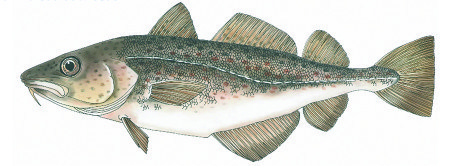 Maine fishermen would be among those hardest hit by a new federal mandate that requires groundfishing boat captains to pay for at-sea monitors, critics say. The at-sea monitors are federally mandated enforcement contractors who can cost upwards of $700 a day, according to litigants in a new lawsuit against the federal government. In Maine, Portland is a major port for ground fishermen, but more remote places such as Cundy’s Harbor out of Harpswell would be affected as well, said New Hampshire fisherman David Goethel, plaintiff in the new case against the U.S. Department of Commerce. Read the article here 17:11
Maine fishermen would be among those hardest hit by a new federal mandate that requires groundfishing boat captains to pay for at-sea monitors, critics say. The at-sea monitors are federally mandated enforcement contractors who can cost upwards of $700 a day, according to litigants in a new lawsuit against the federal government. In Maine, Portland is a major port for ground fishermen, but more remote places such as Cundy’s Harbor out of Harpswell would be affected as well, said New Hampshire fisherman David Goethel, plaintiff in the new case against the U.S. Department of Commerce. Read the article here 17:11
New England fishermen fear looming costs for at-sea monitors
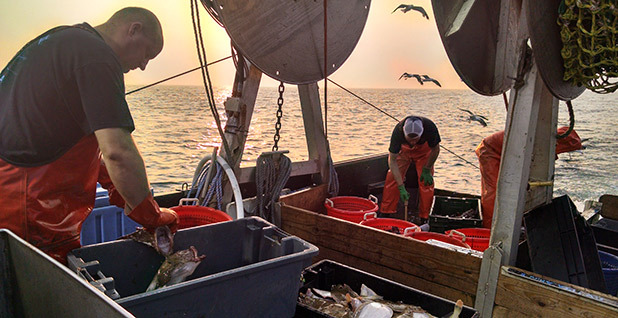 New England fishermen, running out of time before the federal government hands them the cost of monitoring the industry at sea, say emergency intervention is needed or many of them will be out of business. Several New England congressmen said they are looking for ways to reduce the burden for fishermen. U.S. Sen. Kelly Ayotte, a New Hampshire Republican, has submitted a bill to terminate the independent, third-party monitoring program unless it is fully funded by NOAA. She and., requested an investigation of the monitoring program,,, Read the rest here 08:02
New England fishermen, running out of time before the federal government hands them the cost of monitoring the industry at sea, say emergency intervention is needed or many of them will be out of business. Several New England congressmen said they are looking for ways to reduce the burden for fishermen. U.S. Sen. Kelly Ayotte, a New Hampshire Republican, has submitted a bill to terminate the independent, third-party monitoring program unless it is fully funded by NOAA. She and., requested an investigation of the monitoring program,,, Read the rest here 08:02
Moulton, reps press NOAA on monitors
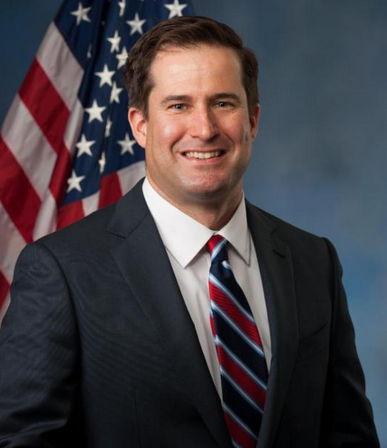 “We made it very clear that we don’t support the costs of at-sea monitoring being shifted to the fishermen,” Moulton said after the meeting. Moulton, along with fellow representatives William Keating, D-Mass., and Chellie Pingree, D-Maine, organized the meeting to help find an alternative to the National Oceanic and Atmospheric Administration’s plan to stop paying for on groundfish boats and shift the costs — estimated at $710 per day per covered vessel — to the federal permit holders. Read the rest here 07:59
“We made it very clear that we don’t support the costs of at-sea monitoring being shifted to the fishermen,” Moulton said after the meeting. Moulton, along with fellow representatives William Keating, D-Mass., and Chellie Pingree, D-Maine, organized the meeting to help find an alternative to the National Oceanic and Atmospheric Administration’s plan to stop paying for on groundfish boats and shift the costs — estimated at $710 per day per covered vessel — to the federal permit holders. Read the rest here 07:59






